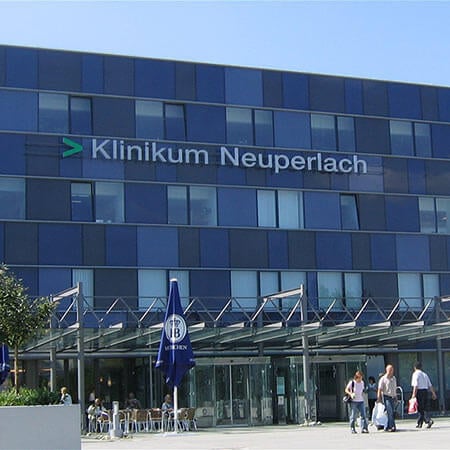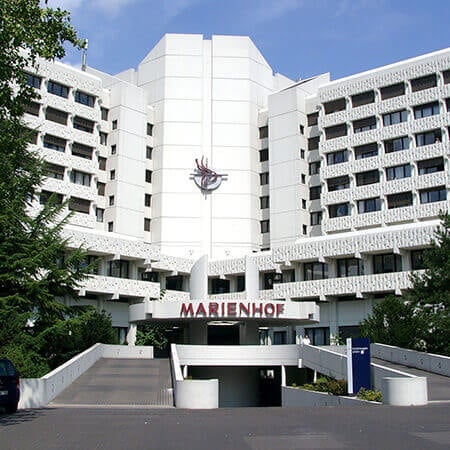Atrioventricular block
Due to the difficulties associated with the organization of treatment in Turkey, Switzerland, South Korea and India, we are not currently processing requests to these regions.
If you are interested in treatment in Germany, please leave a request and our specialists will contact you as soon as possible.
Atrioventricular block is a slowing down or a complete cessation of impulses conduction from the heart atria to the ventricles. Some people have it as a norm (mostly athletes) and it is not a reason to be worried. In other patients, atrioventricular block occurs in case of the heart diseases. In this case, change in the impulse conductivity leads to violations of hemodynamics and can cause sudden cardiac death.
The Booking Health portal presents 78 German clinics specializing in atrioventricular block treatment
Show all clinics
Atrioventricular block – Diagnostics
ECG is the basic method of atrioventricular valve dysplasia diagnostics. A doctor can notice the following peculiarities while analyzing this type of the heart conductivity disorder:
- Stage 1 – an increase in the heart cycle length and the reduction of the heart rate
- Stage 1 type 1 – gradual increase of the heart cycle length followed by the loss of one of the ventricular contractions
- Stage 2 type 2 – a steady heart cycle, the loss of one or several ventricular contractions can be observed from time to time
- Stage 3 – atria and the ventricles contract in different time, independently of each other
The following diagnostic methods help to identify the block stage:
- Transesophageal electrophysiological examination
- Intracardiac electrophysiological examination
The last one is more informative. Electrodes are inserted through the femoral artery into the patient's heart cavity under the X-ray control. They are used for the stimulation.
A doctor takes the electrogram and analyzes the stage of the atrioventricular block (distal or proximal one). Determining this is very important for the selection of treatment tactics.
Best clinics for the atrioventricular block diagnostics in Germany:
Atrioventricular block – Treatment
If there are no symptoms, and there is no risk of complete atrioventricular block, the tactics of monitoring or conservative treatment (prescription of drugs) is used. Otherwise, the basic method of treatment is the implantation of the temporary or permanent heart pacemaker.
Indications for the pacemaker implantation are:
- Stage 3 of the distal blockade
- Stage 2 type 2 of the distal blockade (there is a high risk of the complete AV blockade development)
- Stage 3 of the proximal blockade if it is combined with myocardial infarction
- Any blockade of stage 2-3 which is accompanied by the hemodynamic impairments
Temporary pacemaker is implanted when the patient’s normal heart muscle conductivity is prognosed to be completely restored in the future. If a positive dynamics is unlikely (permanent form of AV blockade), a permanent pacemaker is implanted.
Best clinics for the atrioventricular block treatment in Germany:


Atrioventricular block – Rehabilitation
Cardiological rehabilitation improves the quality of life in patients with cardiovascular diseases. It increases the effectiveness of maintenance treatment in the case of chronic cardiovascular diseases, and also facilitates recovery after exacerbations. Rehabilitation is extremely important in case of cardiac surgical interventions.
Cardiological rehabilitation has the following aims:
- Restoration of heart muscle normal function
- Elimination of symptoms (for example, chest pain, dyspnea, etc.)
- Improving working capacity and providing patient with the opportunity to return to previous professional activities
- Improving physical stamina
- Prevention of exacerbations (including elimination of the risk factors)
- Consulting the patient on self-control and basic principles of self-help
- Improving patient's mental state, ability to "live with the disease"
Effective cardiological rehabilitation is performed only in countries with the developed medicine, as innovative medications, appropriate medical equipment and qualified healthcare professionals are available only there. Basic methods of cardiological rehabilitation include:
- Drug support for normalization of blood pressure, blood clotting, cholesterol level
- Dosed physical exercises under the supervision of an instructor, with a gradual increase in intensity
- Physiotherapy (darsonvalization, electrophoresis with medications, electrosleep, laser and magnetotherapy)
- Relaxing techniques (massage, aromatherapy, acupuncture, psychotherapy)
- Dietotherapy (control of salt and liquid amount, using spices, etc.)
- Modification of lifestyle (smoking cessation, body weight normalization)
In Germany, cardiological rehabilitation undergoes under the constant control of cardiologists, therapists and rehabilitation specialists. Programs are designed for 2 weeks. If necessary, they can last much longer. In this country, the patient is provided with qualitative care, accommodation in comfortable rooms and individually selected meals.
Rehabilitation programs in Germany show one of the best results in the world. Most patients successfully restore their working capacity and excellent health there. They remain physically active, return to the full social and family life.
Best clinics for cardiac rehabilitation in Germany:
Author:
The article was edited by medical expert, board certified Dr. Nadezhda Ivanisova. For the treatment of the conditions referred to in the article you must consult a doctor; the information in the article is not intended for self-medication!
Sources:
ECR - European Cardiology Review
The cost of services includes
Here you can find the cost of treatment for this disease at the German University Hospitals. Leave a request and we will provide a free consultation with a doctor and will start organizing the whole treatment process.
The program includes the following:
- Issuing of an invitation for getting a visa for treatment as quick as possible
- Fixing an appointment at a time convenient for you
- Preliminary organization of a comprehensive examination and discussion of the forthcoming treatment plan
- Arranging transfer from the airport to the hospital and back to the airport
- Provision of interpreting services and services of a personal medical coordinator
- If necessary, assistance in the organization of further surgical treatment
- Provision of a medical insurance against treatment complications covering up to 200,000 euro
- Preparation and translation of medical records and recommendations from the hospital
- Assistance in the subsequent communication with your attending physician, including consultations on repeated X-ray images through the unique medical document management system E-doc




